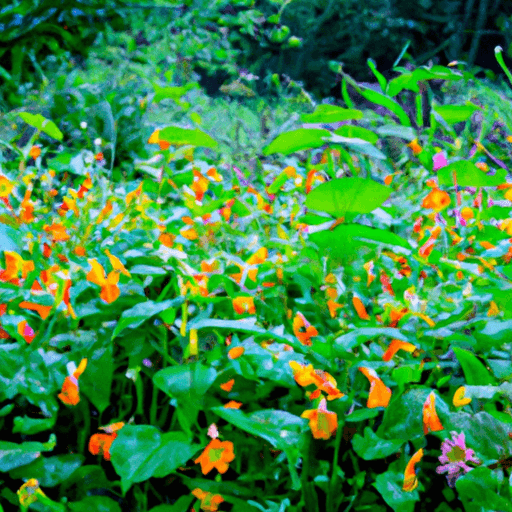Jewelweed, also known as Impatiens capensis, thrives in shaded areas with rich, moist soil. It prefers dappled sunlight and can tolerate some morning sun but should be shielded from strong afternoon rays. Planting in spring or fall is recommended, and regular watering is crucial to maintain consistent moisture. Fertilization is usually unnecessary, but adding compost at planting or in summer can be beneficial.
Known for its skin-soothing properties, jewelweed is a natural remedy for skin irritation, such as poison ivy. It also attracts hummingbirds and butterflies, enhancing garden beauty.
Growing Jewelweed: Tips for Optimal Conditions
Jewelweed prefers shaded areas and thrives in evenly moist soil. It is important to provide optimal growing conditions for jewelweed. This includes planting it in a location with dappled sunlight to full shade and regularly watering to keep the soil consistently moist.
The best locations for growing jewelweed are areas that receive some shade throughout the day, such as under trees or near buildings. It is crucial to avoid planting it in full sun, as the strong afternoon sun can be damaging to the plants.
In terms of watering requirements, jewelweed prefers soil that retains moisture. It is essential to water regularly, especially when the top inch of soil dries out. Adding mulch around the plants can help retain soil moisture and prevent the soil from drying out too quickly.
Planting and Transplanting: Techniques for Success
When planting or transplanting, gardeners should ensure that jewelweed is placed in a shaded area with consistently moist soil. This is because jewelweed thrives in dappled sunlight to full shade and prefers organically rich soil that retains moisture.
To ensure success, it’s recommended to dig compost into the soil prior to planting to provide nutrients and maintain a slightly acidic to neutral soil pH. When transplanting, it’s important to space the plants 12-18 inches apart to allow for proper growth.
Additionally, regular watering is necessary to keep the soil consistently moist, and mulching around the plants can help retain moisture. Gardeners should also fertilize the jewelweed with a balanced fertilizer once a month and remove weeds and dead flowers regularly.
Care and Maintenance: Keeping Jewelweed Healthy
Mulching around the plants helps retain moisture, ensuring that the soil stays consistently moist, which is crucial for keeping jewelweed healthy. This technique not only prevents the soil from drying out but also helps in preventing pests and diseases.
By maintaining a moist environment, jewelweed becomes less susceptible to pest infestations, such as aphids and spider mites. Additionally, proper mulching can also contribute to maximizing blooms. By providing a stable moisture level, jewelweed can focus its energy on producing vibrant and plentiful flowers.
Mulch also helps to suppress weed growth, reducing competition for nutrients and water. To maximize the benefits, it is recommended to apply a layer of organic mulch around the plants, ensuring that it is not directly touching the stems.
Regularly check the mulch layer and replenish as needed to maintain its effectiveness.
Harnessing the Healing Power: Using Jewelweed for Skin Irritation
Applying a topical salve made from jewelweed can help soothe and alleviate various skin conditions. Jewelweed, known for its role in traditional medicine practices, is gaining recognition as a natural alternative to chemical skin remedies. Here are three key points about jewelweed’s healing properties:
-
Traditional Medicine:
Jewelweed has long been used by indigenous cultures as a remedy for skin irritations such as poison ivy and insect bites. Its effectiveness in soothing skin irritation has been passed down through generations. -
Natural Alternative:
With the increasing interest in natural remedies, jewelweed has become a popular choice for those seeking alternatives to chemical-based skincare products. Its compounds have been found to have anti-inflammatory and anti-itch properties, making it an excellent option for those with sensitive skin. -
Topical Salve:
Jewelweed can be transformed into a topical salve that can be applied directly to the affected area. This salve helps to reduce itching, redness, and swelling, providing relief and promoting healing.
Enhancing Your Garden: Jewelweed’s Beauty and Wildlife Benefits
Attracting hummingbirds and butterflies, jewelweed’s vibrant yellow blooms with reddish spots add a splash of color to any garden. Not only does jewelweed enhance the aesthetic appeal, but it also plays a crucial role in attracting pollinators and creating a wildlife habitat.
The nectar-rich flowers of jewelweed are a favorite food source for hummingbirds and butterflies, making it an excellent choice for those looking to attract these beautiful creatures to their garden. By providing a reliable food source, jewelweed helps support the population of these important pollinators, contributing to the overall health and biodiversity of the ecosystem.
Additionally, the dense foliage of jewelweed provides shelter and nesting sites for various wildlife, further creating a thriving habitat for a diverse range of species.
Frequently Asked Questions
How Long Does It Take for Jewelweed Seeds to Germinate?
Jewelweed seeds typically germinate within 7-10 days. To speed up the germination process, soak the seeds in warm water for 24 hours before sowing. Planting in a warm, moist environment also helps.
Can Jewelweed Be Grown in Containers or Does It Need to Be Planted in the Ground?
Jewelweed can be grown in containers or planted in the ground. Planting in the ground allows for larger growth and natural spreading. Growing in containers provides flexibility and control over growing conditions.
Are There Any Specific Pests or Diseases That Commonly Affect Jewelweed?
Common pests that can affect jewelweed include aphids and spider mites. To manage these pests, regular inspection and removal of affected plants is recommended. Additionally, organic insecticidal soaps can be used as a control measure.
Can Jewelweed Be Grown Indoors as a Houseplant?
Jewelweed can be grown indoors as a houseplant, providing a convenient source for its natural remedy benefits. Its ability to soothe skin irritation makes it a valuable addition to any home for quick relief.
Is Jewelweed Safe to Use on All Types of Skin Irritations, or Are There Any Specific Conditions It Should Not Be Used For?
Jewelweed is generally safe for use on various types of skin irritations, but precautions should be taken. It is suitable for sensitive skin, but individuals with allergies or open wounds should avoid using it.







